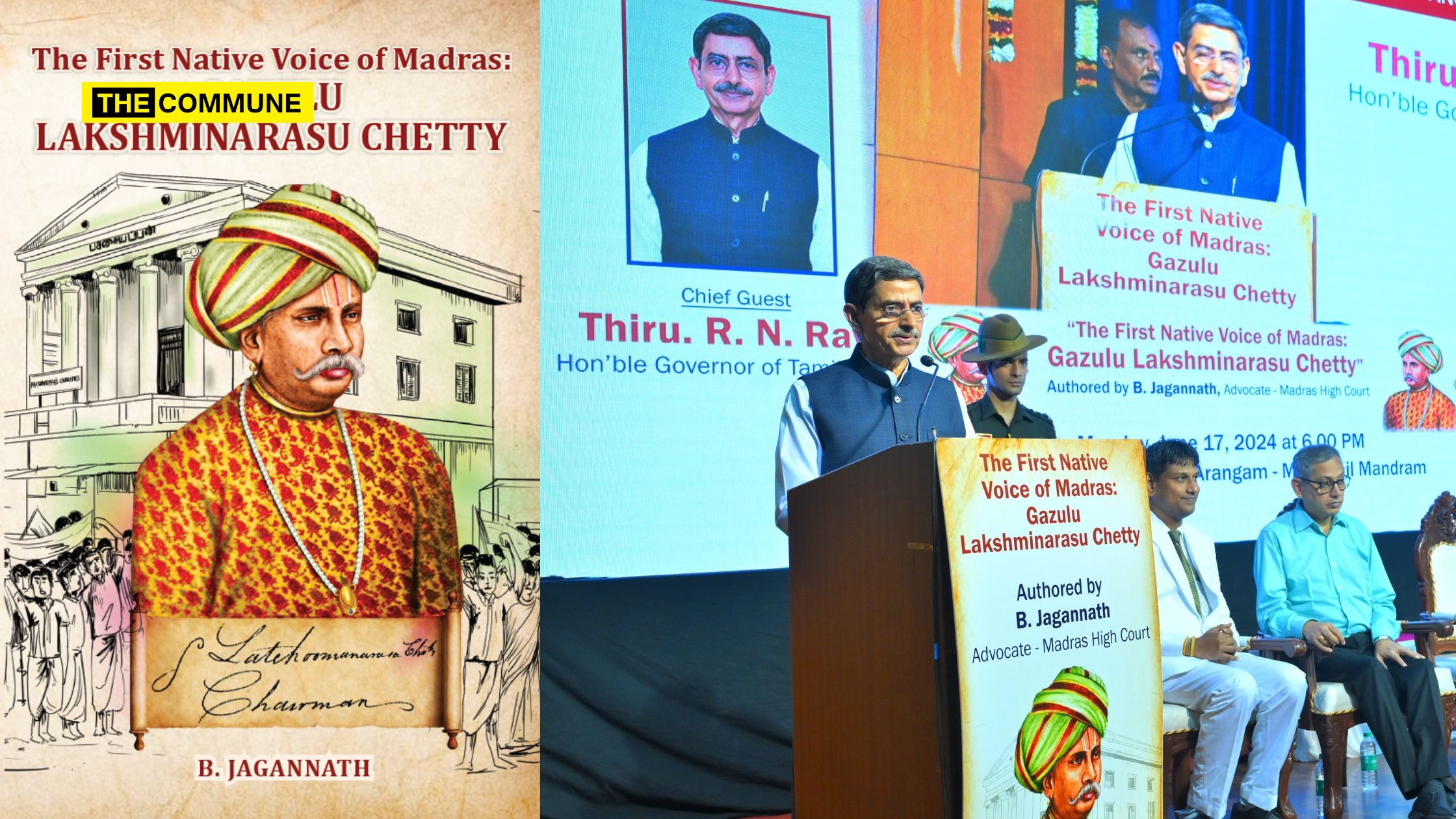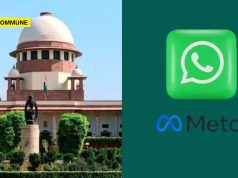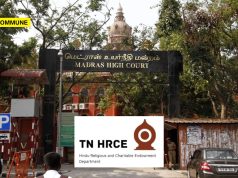
On 17 June 2024, on the day of remembrance of freedom fighter Vanchinathan, a book honouring the legacy of Gazulu Lakshminarasu Chetty, titled “The First Native Voice of Madras: Gazulu Lakshminarasu Chetty” written by B Jagannath was held at TN Rajaratnam Kalai Arangam – Muthamizh Peravai in Adayar, Chennai. The book was released by the Hon’ble Governor of Tamil Nadu, RN Ravi, and the guest of honour at the event was S Vaidyanathan, Chief Justice of Meghalaya High Court.
Gazulu Lakshminarasu Chetty contributed significantly to the Indian freedom struggle and the socio-political landscape of Madras (now Chennai). The book launch event was marked by insightful speeches and discussions highlighting Chetty’s pivotal role in various movements and his lasting impact on the community.
B. Jagannath, the author of the book is also a practicing advocate at the Madras High Court. He revealed that the sources for the book included documents and books from the British Library, Imperial Library, and the Connemara Library. The Centre for South Indian Studies has published the book in Tamil, English, and Telugu, ensuring its widespread accessibility.
Chief Justice of Meghalaya High Court, S. Vaidyanathan, commended the author, who is a lawyer by profession, for his dedication in bringing to light the story of this hidden hero, who was the first Indian to establish and run a newspaper.
Governor R.N. Ravi emphasized the importance of shedding light on the overlooked and forgotten heroes of India’s freedom struggle, whose rich contributions have often been obscured. During an event in the city on Monday, he launched the book commending the author for unearthing the story of this remarkable figure.
According to Governor Ravi, Gazulu Lakshminarasu Chetty deserves recognition for his pioneering efforts in raising awareness about the “evangelization of natives through English education.” He accomplished this through the publication of ‘The Madras Crescent,’ a groundbreaking initiative at the time.
Governor Ravi emphasized the near blackout of the history of the freedom movement in the current university curriculum. The Governor praised the book on Gazulu Lakshminarasu Chetty for its rich content and evidence, describing it as a highly condensed work with the potential to inspire multiple detailed studies on the atrocities committed by the British on Indians. He also highlighted the British government’s systematic attempt to dismantle the extensive native education system known as ‘Vidhyadaan’.
At the book release function of 'The First Native Voice of Madras: Gazulu Lakshminarasu Chetty,' Governor Ravi exhorted the imperative need for rigorous, evidence-based research into the history of 19th and 20th century Bharat to uncover true history and honor countless unsung… pic.twitter.com/fnTzaztTD1
— RAJ BHAVAN, TAMIL NADU (@rajbhavan_tn) June 17, 2024
Governor R.N. Ravi shed light on the traditional Indian education system and its deliberate dismantling by the British. He stated, “The profession of teaching, which was considered a virtue, was no longer a business. Brahmins were mostly teachers. It was these Brahmins who were economically backward and taught education. This system of education was systematically destroyed by the British.”
Governor Ravi highlighted the inclusive nature of education in the Madras province, saying, “Since 1823, education has been taught in Madras province without caste, religion and gender discrimination.” He added, “Tamil, Kannada, Malayalam, Sanskrit, and other educational institutions have functioned separately and as per their convenience. In the 1820s, the education system of our society was free for students.”
Interestingly, Governor Ravi pointed out that “Shudras were more educated than Brahmins in mother tongue education,” emphasizing the widespread access to education across social strata.
Gazulu Lakshminarasu Chetty’s Legacy
Gazulu Lakshminarasu Chetty’s systematic efforts to preserve and promote the identity of the native population were a focal point of the event. He started the Madras Crescent Printing Press, a significant institution in printing and publication history and Chetty can be called the Father of Printing in India.
Chetty’s intervention against the inclusion of the Bible in school curricula by British Christian missionaries was a crucial moment. His actions led to a debate in the House of Commons, ultimately stopping the initiative. This event highlighted his role as a voice of the natives, advocating for their rights in a democratic and non-violent manner through the Madras Native Association and its publication arm, Madras Crescent.
The book reveals that Chetty was instrumental in the first organized political movement in Madras. His petitioning led to the establishment of the Royal Enquiry Commission for Torture, resulting in significant changes that favoured native Indians.
Governor Ravi highlighted historical insights from the book, including the survey ordered by Munroe on educational institutions. The findings revealed that education was community-managed, with tax-free community land sustaining the system. However, Munroe’s policies taxed the majority of this land, disrupting the educational structure. The Governor underscored the 19th century as a period of maximum oppression, forced conversions, and slave trade orchestrated by the British.
The Governor concluded by stressing the need for extensive research to uncover the truth about India’s history under British rule. He called for the integrity of the nation and the identity of the Tamil people to be upheld through diligent scholarship and awareness.
The event served as a poignant reminder of Gazulu Lakshminarasu Chetty’s enduring legacy and the importance of preserving historical truth for future generations.
Subscribe to our channels on Telegram, WhatsApp, and Instagram and get the best stories of the day delivered to you personally.




